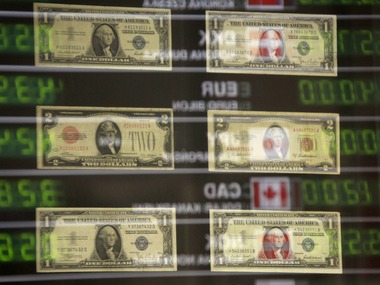How does an average Indian hedge his or her currency risk? Using currency futures is one way but the cost of rollovers is high and many may not have the knowledge or time or both to trade in currency futures.
The best way to hedge the currency risk is to save money in the dollar or any other foreign currency and this can be done by utilising the limits given by the RBI.
The fading of the India growth story is reflected in the fall in the value of the Indian rupee. The rupee has fallen by over 20 percent against the dollar in the last two years on the back of many issues surrounding the country.
[caption id=“attachment_525184” align=“alignleft” width=“380”]  The fading of the India growth story is reflected in the fall in the value of the Indian rupee. Reuters[/caption]
India is facing an unprecedented series of scams (telecom, coal, irrigation and land scams are just some) that is bleeding the country with fiscal deficit projected at 5.3 percent of GDP for 2012-13, which is up by 2 percentage points over the last five years.
India’s GDP growth has fallen from 8.4 percent levels to 5.5 percent levels (forecast for fiscal 2012-13) over the last two years while inflation has been trending higher.
Inflation as measured by the WPI was at over 9 percent levels in the 2010-11 before falling to around 7.5 percent in 2012.
The sharp fall in the value of the rupee has affected many resident Indians. Indians who had plans to study abroad or travel abroad for medical or holiday purposes have been really hit by the fall in the value of the rupee.
For example, if the cost of tuition fees for education in a university in the US was Rs 20 lakh in 2010, it has now become Rs 24 lakh purely due to the 20 percent fall in the rupee value. It is a different matter altogether that many universities abroad have been forced to increase fees or abandon scholarships due to their own funding woes.
Governments in the US and UK and many other countries have cut funding for the education sector due to government debt issues and this has affected students from across the world.
Apart from tuition fees, cost of living abroad is also higher due to fall in the value of the rupee. Indians studying abroad are no longer able to find jobs to sustain themselves due to high unemployment levels in the US and other countries. Unemployment rate at 7.9 percent is 2 percent higher than long-term averages in the US while eurozone unemployment is at record highs of over 11 percent.
Healthcare spending cuts has increased cost of medical treatment leading to double whammy for Indians planning to go abroad for health reasons. Holidaying abroad is also more expensive due to the fall in the rupee value. Hence apart from Indians having illegal dollar accounts, the fall in rupee value is hurting the average resident Indian who has plans to go abroad.
Liberalized remittance scheme
The RBI has liberalised foreign exchange remittance where a resident Indian can freely remit foreign currency abroad up to a limit of $200,000 per year. The RBI started the liberalised remittance scheme in 2004 with a limit of $25,000 and the limit has steadily increased to $200,000 as of 2012.
Resident Indians can open foreign currency bank accounts and place deposits in the accounts to a limit of $200,000 per year. Indians can also invest in assets abroad, including equity, bonds, property etc. The RBI has put out an FAQ on the liberalised remittance scheme (updated as of 20 January 2012). The link to the FAQ is given below.
Indians should use the liberalized remittance facility given by the RBI to save for education, medical, travel or any other plans that require expenditure in foreign currency. The savings in dollar or any other foreign currency can help hedge the rupee’s fall.
On a separate note, any Indian having foreign currency assets including bank deposits, the value of which is more than the limit given by the RBI should have a clear and transparent trail to the assets. No matter who the person is, the limit of $200,000 given by the RBI is the legal limit and any transgression of the limit is tantamount to illegal transactions.
Arjun Parthasarathy is the Editor of www.investorsareidiots.com a web site for investors.


)
)
)
)
)
)
)
)
)



